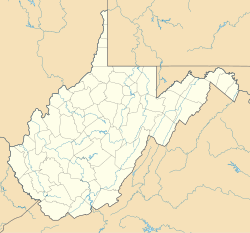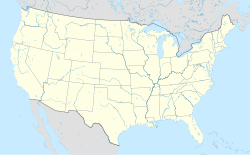Vulcan, West Virginia: Difference between revisions
m Reverted edits by 2601:192:4D80:1A4:5F9:7F16:4749:6E29 (talk) (HG) (3.3.3) |
ConradKilroy (talk | contribs) m Added extra citation link |
||
| Line 84: | Line 84: | ||
The community was named after [[Vulcan (mythology)|Vulcan]], the god of fire in Roman mythology.<ref>{{cite book|last=Kenny|first=Hamill|title=West Virginia Place Names: Their Origin and Meaning, Including the Nomenclature of the Streams and Mountains|url=https://babel.hathitrust.org/cgi/pt?id=mdp.39015009099824;view=1up;seq=676;size=125|year=1945|publisher=The Place Name Press|location=Piedmont, WV|page=652}}</ref> |
The community was named after [[Vulcan (mythology)|Vulcan]], the god of fire in Roman mythology.<ref>{{cite book|last=Kenny|first=Hamill|title=West Virginia Place Names: Their Origin and Meaning, Including the Nomenclature of the Streams and Mountains|url=https://babel.hathitrust.org/cgi/pt?id=mdp.39015009099824;view=1up;seq=676;size=125|year=1945|publisher=The Place Name Press|location=Piedmont, WV|page=652}}</ref> |
||
In 1977, John Robinette, acting mayor of Vulcan, requested foreign aid from the [[Soviet Union]] and [[East Germany]] to replace the town's bridge after unsuccessful efforts to get the state to replace it. The bridge was the sole route to legally enter and exit the town, and it had collapsed two years previously.<ref>http://tvnews.vanderbilt.edu/program.pl?ID=253642</ref> Russian journalist Iona Andronov visited Vulcan on December 17, 1977 to meet with Robinette and survey the problem. Within an hour of his visit, reporters were told that the state would replace the bridge. The West Virginia state legislature provided $1.3 million in funding to replace the bridge.<ref>{{Cite news|url=http://www.nytimes.com/1991/07/22/us/west-virginia-roads-a-bumpy-legacy-lives-on.html|title=West Virginia Roads: A Bumpy Legacy Lives On|last=DePARLE|first=JASON|date=1991-07-22|work=The New York Times|access-date=2018-02-26|language=en-US|issn=0362-4331}}</ref><ref>{{Cite news|url=https://news.google.com/newspapers?id=0g0wAAAAIBAJ&sjid=sgUEAAAAIBAJ&pg=2235%2C462258|title=West Virginia Bridge Being Built Without Russian Aid|last=|first=|date=1980-01-02|work=Ocala Star-Banner|access-date=2018-02-25|archive-url=|archive-date=|dead-url=|via=Google Newspaper Archive}}</ref> |
In 1977, John Robinette, acting mayor of Vulcan, requested foreign aid from the [[Soviet Union]] and [[East Germany]] to replace the town's bridge after unsuccessful efforts to get the state to replace it. The bridge was the sole route to legally enter and exit the town, and it had collapsed two years previously.<ref>http://tvnews.vanderbilt.edu/program.pl?ID=253642</ref> <ref>http://appalachianmagazine.com/2014/02/23/the-west-virginia-town-that-applied-for-soviet-foreign-aid-1/ </ref> Russian journalist Iona Andronov visited Vulcan on December 17, 1977 to meet with Robinette and survey the problem. Within an hour of his visit, reporters were told that the state would replace the bridge. The West Virginia state legislature provided $1.3 million in funding to replace the bridge.<ref>{{Cite news|url=http://www.nytimes.com/1991/07/22/us/west-virginia-roads-a-bumpy-legacy-lives-on.html|title=West Virginia Roads: A Bumpy Legacy Lives On|last=DePARLE|first=JASON|date=1991-07-22|work=The New York Times|access-date=2018-02-26|language=en-US|issn=0362-4331}}</ref><ref>{{Cite news|url=https://news.google.com/newspapers?id=0g0wAAAAIBAJ&sjid=sgUEAAAAIBAJ&pg=2235%2C462258|title=West Virginia Bridge Being Built Without Russian Aid|last=|first=|date=1980-01-02|work=Ocala Star-Banner|access-date=2018-02-25|archive-url=|archive-date=|dead-url=|via=Google Newspaper Archive}}</ref> |
||
{{Clear|left}} |
{{Clear|left}} |
||
{{wide image|Vulcan, West Virginia.jpg|1000px|alt=Vulcan in 2014|Vulcan in 2014}} |
{{wide image|Vulcan, West Virginia.jpg|1000px|alt=Vulcan in 2014|Vulcan in 2014}} |
||
Revision as of 02:06, 26 February 2018
Vulcan, West Virginia | |
|---|---|
| Coordinates: 37°33′08″N 82°07′33″W / 37.55222°N 82.12583°W | |
| Country | United States |
| State | West Virginia |
| County | Mingo |
| Elevation | 738 ft (225 m) |
| Time zone | UTC-5 (Eastern (EST)) |
| • Summer (DST) | UTC-4 (EDT) |
| ZIP codes | 25697 |
| Area code(s) | 304 & 681 |
| GNIS feature ID | 1555899[1] |
Vulcan is an unincorporated community in Mingo County, West Virginia, United States. Vulcan is located along the Tug Fork across from the state of Kentucky.

The community was named after Vulcan, the god of fire in Roman mythology.[2]
In 1977, John Robinette, acting mayor of Vulcan, requested foreign aid from the Soviet Union and East Germany to replace the town's bridge after unsuccessful efforts to get the state to replace it. The bridge was the sole route to legally enter and exit the town, and it had collapsed two years previously.[3] [4] Russian journalist Iona Andronov visited Vulcan on December 17, 1977 to meet with Robinette and survey the problem. Within an hour of his visit, reporters were told that the state would replace the bridge. The West Virginia state legislature provided $1.3 million in funding to replace the bridge.[5][6]
References
- ^ "US Board on Geographic Names". United States Geological Survey. 2007-10-25. Retrieved 2008-01-31.
- ^ Kenny, Hamill (1945). West Virginia Place Names: Their Origin and Meaning, Including the Nomenclature of the Streams and Mountains. Piedmont, WV: The Place Name Press. p. 652.
- ^ http://tvnews.vanderbilt.edu/program.pl?ID=253642
- ^ http://appalachianmagazine.com/2014/02/23/the-west-virginia-town-that-applied-for-soviet-foreign-aid-1/
- ^ DePARLE, JASON (1991-07-22). "West Virginia Roads: A Bumpy Legacy Lives On". The New York Times. ISSN 0362-4331. Retrieved 2018-02-26.
- ^ "West Virginia Bridge Being Built Without Russian Aid". Ocala Star-Banner. 1980-01-02. Retrieved 2018-02-25 – via Google Newspaper Archive.
{{cite news}}: Cite has empty unknown parameter:|dead-url=(help)



